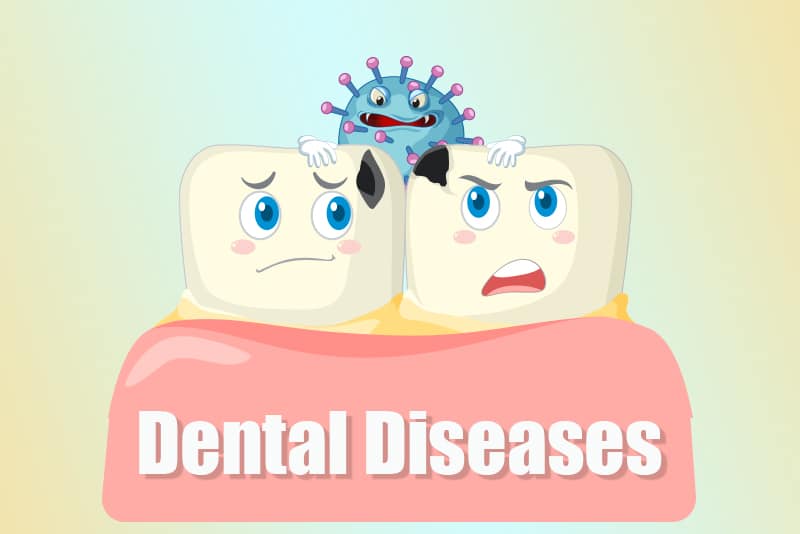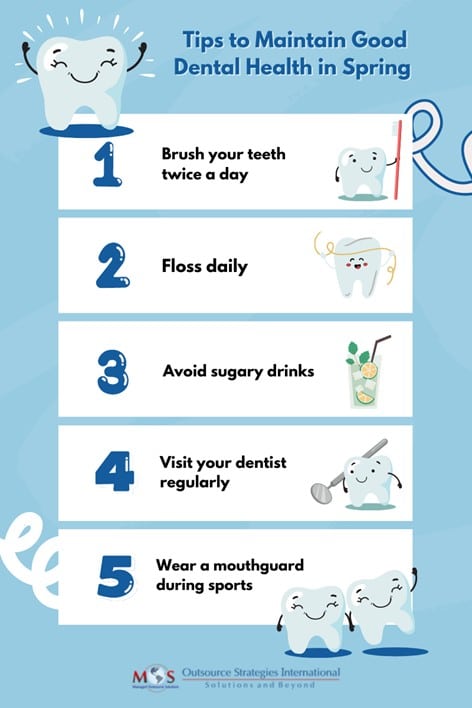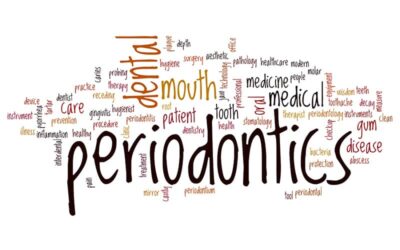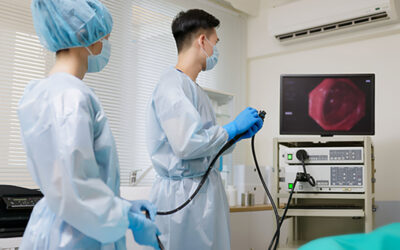Spring is the perfect time to give attention to oral health. Refreshing one’s oral hygiene routine, replacing old toothbrushes, and scheduling a dental check-up can contribute to a healthier smile. Spring also sets the stage for the upcoming summer season when people may attend social gatherings, events, and enjoy their vacation. By focusing on oral health in spring, one can ensure a confident smile and enjoy the summer activities without dental discomfort or concerns.
While dental practitioners focus on patient care, experienced dental billing companies can support them in managing the claim submission tasks and thus achieve on-time reimbursement.

Finding dental coding challenging? Let our coding professionals handle it for you!
Schedule a free consultation with our experts – call (800) 670 2809
Read more on our dental billing services
Spring Dental Health Concerns and Their ICD-10 Codes
Some of the common dental issues that may occur during spring are:
Seasonal Allergies: Spring allergies can lead to increased nasal congestion and post-nasal drip, which can contribute to dry mouth. Dry mouth reduces saliva flow, making it easier for bacteria to thrive and potentially leading to an increased risk of tooth decay and gum disease.
Spring allergies and the use of allergy medications can contribute to dry mouth, increasing the risk of developing tooth decay and gum disease. Often, dentists recommend antihistamines or nasal sprays to manage allergies, while also asking patients to maintain excellent oral hygiene practices. Seasonal allergies can cause gum and tonsil swelling.
- J35.1 Hypertrophy of tonsils
- K06.1 Gingival enlargement
Tooth Sensitivity: Many people experience increased tooth sensitivity during spring. Changes in temperature, consuming cold drinks or eating ice cream after winter, can trigger discomfort. Using toothpaste specifically designed for sensitive teeth and avoiding extremely hot or cold foods can help alleviate discomfort associated with sensitive teeth,.
- K03.8 Other specified diseases of hard tissues of teeth
- K03.81 Cracked tooth
- K03.89 Other specified diseases of hard tissues of teeth
- K03.9 Disease of hard tissues of teeth, unspecified
Oral Health Neglect during Vacation: Spring break and vacations often lead to a break from regular routines, including oral hygiene habits. Neglecting oral care during these periods can increase the risk of dental issues such as cavities and gum disease. Dentists advise patients to continue brushing twice a day, flossing daily, and maintaining regular dental check-ups, even when on vacation.
- K02.3 Arrested dental caries
- K02.5 Dental caries on pit and fissure surface
- K02.51 …… limited to enamel
- K02.52 …… penetrating into dentin
- K02.53 …… penetrating into pulp
- K02.6 Dental caries on smooth surface
- K02.61 …… limited to enamel
- K02.62 …… penetrating into dentin
- K02.63 …… penetrating into pulp
- K02.7 Dental root caries
- K02.9 Dental caries, unspecified
Periodontal disease has two stages: gingivitis and periodontitis.
- K05 Gingivitis and periodontal diseases
- K05.0 Acute gingivitis
- K05.1 Chronic gingivitis
- K05.2 Aggressive periodontitis
- K05.3 Chronic periodontitis
- K05.4 Periodontosis
- K05.5 Other periodontal diseases
- K05.6 Periodontal disease, unspecified
Sports-related Injuries: Spring is a popular time for outdoor sports and recreational activities. However, without proper protective gear, dental injuries can occur, such as chipped or knocked-out teeth. People engaging in sports or physical activities should ideally wear a mouthguard to protect the teeth and mouth.
- K03.81 Cracked tooth
- K08.11 Complete loss of teeth due to trauma
- K08.111 …… class I
- K08.112 …… class II
- K08.113 …… class III
- K08.114 …… class IV
- K08.119 …… unspecified class
With Easter festivities and the abundance of candy, it’s important to be mindful of the increased consumption of sugary treats during spring. Excessive sugar intake can contribute to tooth decay. Dentists advise patients to practice moderation, maintain good oral hygiene habits, and consider choosing healthier alternatives or limiting candy intake to specific times of the day.
Proper dental billing services are vital for ensuring accurate reimbursement, compliance with regulations, minimizing claim denials, optimizing revenue management, improving the patient experience, facilitating data analysis, and upholding legal and ethical responsibilities. By investing in professional dental coding services, practices can operate more efficiently, provide better patient care, and maintain financial stability.
At OSI (Outsource Strategies International), we stay up-to-date with the latest dental coding regulations!
Contact us today at (800) 670 2809






